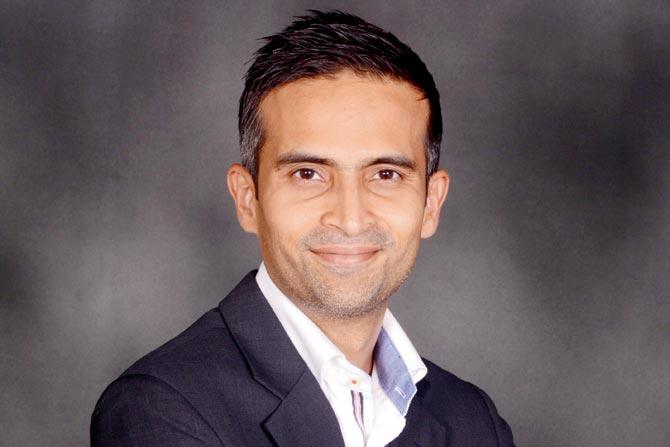Leaders of top Indian firms admit two months of grappling with a virus, the lockdown and an economic downturn has challenged every corporate rule in their book, leading to an enlightened unlearning they are both grateful for and surprised at

Gautam Dutta, CEO, PVR Cinemas; Vikram Mehra, Managing Director, Saregama India Ltd; Sanjay Murdeshwar, Managing Director, Novartis India; Shailaz Nag, Co-Founder, Dotpe; Samir Srivastav, CEO, Jean-Claude Biguine Salon & Spa India and Shailesh Sawlani, C
By the time PM Narendra Modi announced the Janata Curfew on March 20, as a measure to arrest the Coronavirus pandemic, most of India-s firms had already asked their employees to work from home. But no one had a clue how long this would last.
ADVERTISEMENT
The initial days were rough sailing. For a work culture that-s taken pride in long hours, constant monitoring of productivity, and strict attendance, suddenly not being face to face proved a challenge. In fact, a Twitter poll conducted by this newspaper in the first week of April, asking if India is ready for a work from home culture, registered a 60 per cent -No- vote. And yet, nearly two months down the line, most people are not just comfortable working from home, but many firms have informally extended their return to office deadlines to cope better with the pandemic.
What, then, has changed?
Surprisingly, many firms say, that productivity at home, despite strenuous circumstances and the absence of help, has improved. Companies have learnt to listen to employees and reduce video calls, and be flexible about work hours. Leadership across top firms in India says they-ve learnt in two months what they hadn-t in a career.
Pharmaceuticals
-Learning resources are valuable-

Sanjay Murdeshwar
Managing Director, Novartis India
There was a time when work from home was viewed as a privilege even at organisations where it was offered. People were sceptical of how this would be construed by the organisation. Now, it is the norm. The culture at Novartis is based on the tenets of being curious, unbossed and inspired. All of these elements are now in action and imbibed during a regular work day. For example, we have restructured the time available to our associates on personal learning via advanced learning resources, to build on our culture of being curious and accelerating the use of digital to self-manage their time and resources. While we had begun offering learning resources to our people last year, the uptake was slower than desired. But, with the lockdown, people are looking at learning as an opportunity and using the time saved from commuting on learning.
While we had begun progressing in the digital space even before the lockdown, we found that our people adapted to it faster. So, whether it was moving to a new digital engagement platform internally or using the digital medium to engage with customers or supporting patients on our patient support programmes, we have seen a speedy adoption of technology.
Productivity has gone up. Our associates are more disciplined in interactions with colleagues. Meetings are shorter and more consequential with clear goals.
A crisis, it is said, brings out either the worst or the best in people. I have experienced resilience and fortitude. I have seen my team rally around each other, being ever ready to go that extra mile. I have seen a greater willingness to experiment with new ideas and to look at things from a different perspective. I have actually begun to get to know them better because we now also see the human side to our colleagues, and how we deal with running our homes and our work lives. The video calls actually brought the team members into my home, which is a very personal space. I think this has made us appreciate better the contribution that everyone has made to keep the organisation running.
Entertainment
-Short meetings are productive-

Gautam Dutta
CEO, PVR Cinemas
IN the initial days of the lockdown, we didn-t know where we were going. For a week or so, it was a holiday, with all of us anticipating and seeking clarity. Then we got together on a clear call to decide the course of action.
We realised that we needed technology, a place to sit and a certain discipline. That bit was important. Wherever we were, we had to have the discipline to stay connected. Time frames were to be created, with rosters and calendars updated.
We divided the work amongst ourselves and moved it to the IT team. It was the first team to get into action and work on setting up offsite operations. Everyone was trained for a day on the various apps we-d now be using—Zoom, Microsoft team, and so on. We have international vendors and partners and not everyone was using Zoom. Several of us were at age 45 and above and not very tech savvy. In the office, it-s different; you can make a call to the IT department for help, but here we were on our own. We had our kids to help a bit, fortunately.
Once those modalities were in place, we fixed our calls and held internal discussions with our HODs. For the first time, we looked at time management and planning which were polished at every level. And the output started picking up.
At home, you don-t have the luxury of indiscipline that you have at office, where you say let-s go into a conference room and walk in 10 minutes later. If a Zoom call is at 12 noon. Every one needs to log in within a minute max of noon.
There are lessons to be learnt there and hopefully they will stay with us. The output of the meetings surprised us. We knew when we left the meeting exactly what we had achieved; the minutes were mailed immediately and action plans formulated. We have discovered great new ways of working in the process, and I am sure this is happening the world over.
Music
-Productivity can be high without policing-

Vikram Mehra
Managing Director, Saregama India Ltd
There was shock initially about what had happened and apprehensions about whether everyone would perform efficiently and effectively at home. We are a creative company and it-s believed that people are creative if they are together, feeding off each other and debating.
A big issue that-s germane to this conversation is how we are brought up. Parents check everything the child does. Even if they are 13 or 14 years old, they will check notebooks and ensure that the child has done the work. The idea being that if you don-t monitor, people don-t do what they are assigned. The assumption is therefore, that it-s easier to monitor people in office.
But, my greatest learning has been that the only thing that matters is if the employee is motivated to contribute. By putting the fear of the boss in the staff-s minds, nobody has achieved anything great. We have always paid more heed to attitude than skills, and this I believe has kept us in good stead. Our productivity is higher now.
I belong to a bunch of oldies, who thought that WFH cannot be efficient, and was apprehensive. And I have been proven wrong. You realise that commute in Mumbai drains you out so much that by the time you reach work and get into a relaxed state, it-s time to start thinking of going back home. Once we settled into the WFH cycle, people began to contribute at far higher levels of engagement.
There were initial hiccups in March, and we looked at timelines for calls that were suited for most people and finalised 12 pm to 4 pm. Those with kids preferred 4 pm to 6 pm and they were allowed to attend to calls during that time. People are not being called on a daily basis. We are only measuring output. If you want to work at 1.30 am, and not at 12 pm, how does it matter? The big business lessons have been that calamity can come at any time, and that anything can happen to corporates and you need to diversify your risks. The second is that employees are your biggest asset and motivated employees will make the difference between successful and unsuccessful companies.
Audio books
-Flexibility can encourage discipline-

Shailesh Sawlani
Country Head, Audible, India
There were apprehensions initially because we didn-t have a shared schedule, there was the absence of physical space where we could collaborate and meet. We weren-t concerned about not having employees in front of us, because we have had a policy of flexibility and treating them as individuals anyway, and we have been practising a fair share of that, but to apply that to the whole team at a given time, was certainly a point of concern.
We have a diverse workforce of all age groups and different accommodation circumstances; someone lives in a studio apartment, someone has a larger home; then there were personal circumstances that could affect their productivity. Some of the physical infrastructure that they make use of in the office was also possibly no longer available—an ergonomic desk and chair, external monitor so that you don-t have to bend and stoop your shoulders to look into a laptop, and so on. These are the things you take for granted at office.
And, at home, there are family commitments. If your spouse is also working from home, you have to share the load, especially if there-s a kid at home and home-based learning is happening.
We conducted surveys to keep a pulse check and colleagues revealed issues with steady/speedy Internet connections and too many meetings being scheduled on conference call. In an office environment, you can walk up to a person and get an answer. Over here, with messaging on a platform, that creates so many different interruptions and fatigue with an -always on- mentality; it became difficult to disengage from work. The way we connected with the team before the lockdown—going out for lunch together or a lunch walk—was also something we realised we took for granted.
So, we set up a reimbursement policy to resolve any needs pertaining to equipment—keyboard, dongle etc. To manage excess of meetings, we made cultural changes as well and encouraged people to block their calendars during lunch time. Say a slot of between 12 pm to 1 pm. If you block that time, other colleagues try not to set up a meeting during that slot.
We also marked a meeting-free day where people could be focussed on their individual work, or coordinate with spouses and family for personal arrangements. Everyone was always free to choose what hour they wanted to work.
We also started fortnightly catch ups on VC on Friday evenings, whether to play a fun quiz or unwind and bond with colleagues.
In a situation where external circumstances are not as pronounced, this has taught us that some amount of flexibility actually works in an organisation-s favour. It certainly warrants a constructive discussion on what the future of work from office and home looks like.
Beauty
-To keep staff productive, they must be engaged-

Samir Srivastav
CEO, Jean-Claude Biguine Salon & Spa India
OURS is an industry that is reliant on physical touch and contact with the customer. So, we shut our salons, across the country on March 15, as we were worried for clients and staff. But during the lockdown, we had to keep our hair dressers and beauticians engaged. Used to a busy schedule of nine hours of work, they were experiencing a void where they had nothing to do.
We engaged our brand partners and put together trainers and created planned calendars for 45 days. We organised skill sessions, pertaining to hair training, refresher courses on how to propose products. This is the time when new haircuts are exhibited in Paris, as the spring, summer, fall and winter looks, so we took 103 hair dressers through various modules.
At some point, we realised that it had become monotonous and interest was plateauing. So we changed the approach and started attitudinal training by getting in retail and hospitality specialists. When that became boring, we turned to other fun workshops.
I think this is the time when leaders need to be most visible. You have to understand your team-s apprehensions and what motivates them. I-d send them messages in the morning, pepping them up, asking about their families, and keeping the channel to share information open.
Digital Payment
-Critical to know person behind the colleague-

Shailaz Nag
Co-Founder, Dotpe
We realised that communicating and connecting frequently with team members was key. During isolation, nothing was more unnerving than silence. Apart from this, several new employees joined us during this phase and the HR team ensured smooth onboarding. While WFH has given us more flexibility, the need and time to commute has reduced. The importance of personal and one-to-many connect during the meetings is something we miss at times, and hope that humanity will be able to overcome this crisis soon.
I have realised that so many of my team members have emerged as cooks over the past two months, a talent which they didn-t imagine they had. We have seen people experiment with food and share skills on chat groups and video calls during the all hands meet. In fact, since the onset of the lockdown, we have held weekly all-employee catch-ups to hear from everyone directly and answer any questions they may have. Gradually, these calls turned into talent shows! We invited colleagues to share inspiring personal stories, showcase their love for music, food or life in general. This worked wonders in helping bring people closer.
Catch up on all the latest Mumbai news, crime news, current affairs, and a complete guide from food to things to do and events across Mumbai. Also download the new mid-day Android and iOS apps to get latest updates.
Mid-Day is now on Telegram. Click here to join our channel @middayinfomedialtd and stay updated with the latest news
 Subscribe today by clicking the link and stay updated with the latest news!" Click here!
Subscribe today by clicking the link and stay updated with the latest news!" Click here!






